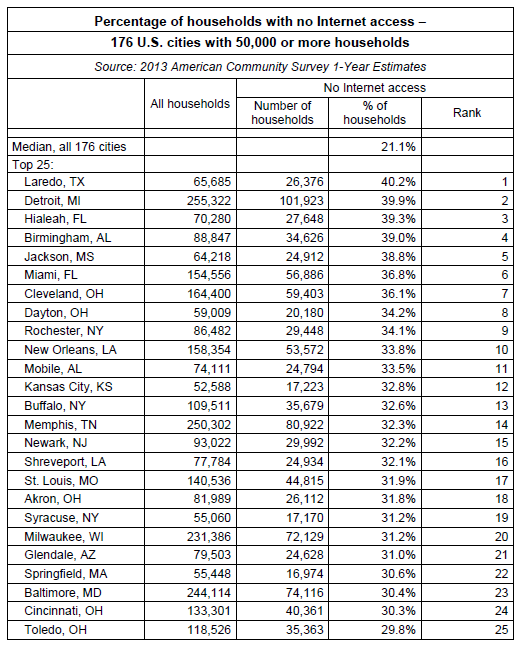In Detroit and other cities, nearly 40 percent go without Internet
Jon Brodkin, ARS Technica
Published: November 4, 2014
It may be hard to believe, but there are big cities in the US where 30 to 40 percent of residents have no Internet service at all. And among those who are online in America's worst-connected cities, a sizable percentage get by with only cellular Internet.
That's according to 2013 census data compiled by Bill Callahan, director of Connect Your Community 2.0, a group promoting Internet access for residents of Cleveland, OH, and Detroit, MI.
Callahan published charts on his blog yesterday showing how many households lack Internet access in the 25 worst connected cities in the US (out of 176 that have at least 50,000 households). In Laredo, TX, 40.2 percent of the 65,685 households have no Internet access, not even mobile broadband on a phone. Detroit was second in this list with 39.9 percent of households lacking Internet. In all 25 cities, at least 29.8 percent lacked Internet access. The 25 cities varied in size from 52,588 households (Kansas City, KS) to 255,322 households (Detroit).

Data came from the 2013 American Community Survey. Nationwide, 24.9 million households out of 116.3 million lacked Internet access.
Callahan also calculated percentages of households without fixed broadband subscriptions. This includes homes without any Internet access, homes that have Internet access without a subscription, homes with mobile broadband only or with dialup, and homes with dialup only.
In this measure, Detroit was worst with 56.9 percent of households lacking a fixed broadband subscription. Fresno, CA was 25th worst city with 41.9 percent of households lacking a fixed broadband subscription.
Broadband access is often measured by how many people could buy Internet service if they wanted to and could afford it. Things are better by this measure—nearly 94 percent of American homes have access to at least one wired broadband provider offering at least 3Mbps download speeds. The number goes up if you include satellite.
But the Census numbers in Callahan's post show how many people actually buy broadband, and it's clear many people simply cannot afford it. A lack of competition to drive prices down contributes to this problem.
Various government programs and private initiatives try to close the digital divide but one of those almost went by the wayside in Detroit. Comcast was forced to offer $10-per-month service to low-income families in order to get its 2011 purchase of NBCUniversal approved. That cheap service will be extended to Time Warner Cable territory if Comcast's merger with that company is approved.
But the merger includes the creation of a new spinoff company called GreatLand Connections, which will serve Detroit and other areas. GreatLand will not be obligated to continue offering the cheap Internet service for poor people, Comcast has said. But GreatLand Connections later said in an FCC filing that it will continue offering the cheap Internet service to poor people.
Editor's note: The original version of this story did not include GreatLand's statement that it will continue offering cheap Internet service to low-income families.